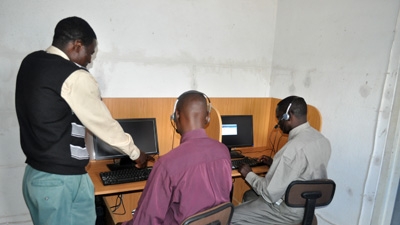CHIPITA, March 3, 2014 -- Abraham Sinyenga, 28, from the remote Chipita district in north Malawi, had never heard of the internet until several months ago when an overseas relative asked him to open an e-mail account for easy communication. E-mail was strange to him. Even stranger was the thought of using a computer.
“This set me into a mission of learning,” said Sinyenga. “I went to a telecenter at the district administration headquarters where I was schooled about what this internet fuss is all about.”
Sinyenga was able to visit a telecenter thanks to governments’ goal to provide telecommunications access to all of its residents, particularly those who live in rural areas. Through the Infrastructure Services Project (ISP) and the Malawi Communications Infrastructure Project (MCIP), both supported by the World Bank, the government has been able to establish telecenters throughout the country, providing not only computer and internet services, but telephone, fax, photocopying, television, laminating and printing services.
In addition to telecommunications facilities in market centers, the $40million ISP also provides electricity, water and roads to five, targeted, rural growth corridors in the country. The $20 million MCIP is part of a 10-year, multi-country Regional Communications Infrastructure Program (RCIP), designed to assist Eastern and Southern African countries with affordable telecommunication services. By the end of the project, all city capitals and major cities will be linked to competitively-priced bandwidth, which will help equip Africa to trade competitively on a level playing field, extend education beyond the classroom and accelerate good governance.
The rollout of access networks is projected to cover 100 selected public institutions such as schools, colleges, health centers, and district administration offices through the RCIP. Under such initiatives, districts such as Machinga in eastern Malawi are now able to access internet services at the rural telecommunications centers (RTCs). The Machinga RTC is well patronized by people of various ages and backgrounds, and about 40% of them are female.
“This place is so invaluable to the surrounding communities,” said Charles Kashoni, manager of the Machinga RTC. “We offer lessons on how to use the computer so that our clients can open email accounts, keep in touch with friends, business colleagues, and search for information on the net.”
Machinga district is a place that looks to be remote and out of touch with current events in the rest of the world, Kashoni said, but the opposite is true.
“In Machinga, in what would have been considered the backwoods, you can keep abreast of events anywhere, not just in Malawi but the world over,” he said. “However remote Machinga might seem, it is just as connected and in touch with the rest of the world, thanks to the presence of the telecenter.”
During the official opening of the Lupaso Telecenter at Mwapanya Village in Karonga District, Vice President Right Honorable Khumbo Kachali underscored the government’s commitment to advancing telecommunications access throughout the country.
“The world is becoming a global village and it is important that we make informed decisions for development purposes through access to equal and accurate information,” he said.
Anthony Livuza, the Ministry of Information’s Principal Secretary, said the government supports the expansion of information and communications technology because they believe that ICT holds the key to development in the 21st century.
“Much of the poverty in our midst, much of the illiteracy among the population, much of the isolation in our communities, can be tackled when people have access to information on various issues affecting their lives,” he said. “ICT remains central to our effort to build a modern society.”

